
CELEBRATORY EVENT FOR THE ANNIVERSARY
The Legacy of Margarete von Wrangell Lives On
It has been exactly 100 years since Margarete von Wrangell was appointed the first full professor in Germany at the „Agricultural College of Hohenheim“, which is the University of Hohenheim today. To mark this occasion, the University of Hohenheim organized a celebratory event on March 27, 2023, intended to kick off additional events in the anniversary year.
The number of visitors was so large that the balcony hall of the castle was filled to the last seat. Descendants of Margarete von Wrangell were also present as guests. The Ministry of Science, Research, and Art of Baden-Württemberg, the University of Hohenheim, the State Conference of Equality Officers at the Scientific Universities of Baden-Württemberg (LaKoG), and the Association of Baden-Württemberg Scientists (VBWW) had put together a varied program.
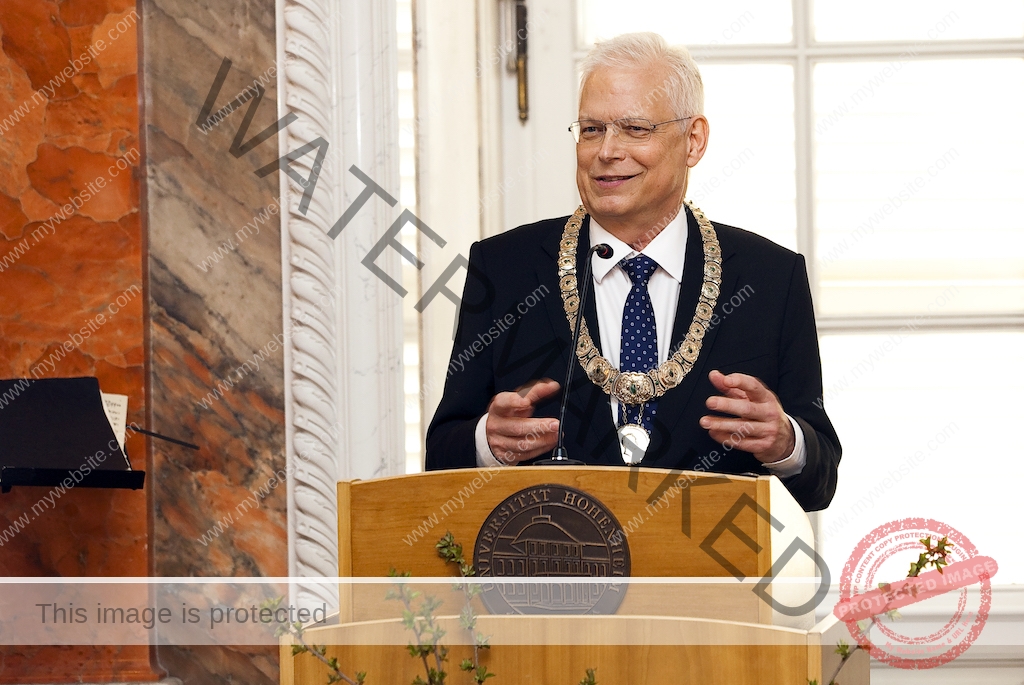
Prof. Dr. Dabbert, Rektor University of Hohenheim
Rektor Prof. Dr. Dabbert
„A lot has changed for women in the field of science, but there is still much to do!“
Prof. Dr. Stephan Dabbert, Rector of the University of Hohenheim, emphasized that his university is proud to have appointed the first full professor in Germany. However, he also noted that although a lot has changed for women in the field of science over the past decades, the University of Hohenheim is not yet where it wants to be.
Rector Dabbert praised the Tenure Track Program, for which many young female scientists in Hohenheim have successfully applied. He is also pleased that, currently, four out of six positions in the Rectorate are occupied by women. However, there are still bodies, such as the Senate, where women are significantly underrepresented.
Minister of Education Bettina Stark-Watzinger also praised Margarete von Wrangell’s research work and its significance for her time in her video message. She drew a connection to the present and current challenges. Von Wrangell also represents many innovative women in research who are often still far too invisible. “It is time to bring women and their achievements into the spotlight,” emphasized Stark-Watzinger.
Moderated Discussion
Support programs for woman are successful
One way to support women in their scientific careers is through support programs. This includes the Margarete-von-Wrangell Habilitation Program, which was initiated in 1997 by the state of Baden-Württemberg and, according to Dr. Dagmar Höppel from the Association of Baden-Württemberg Scientists, has developed “enormous radiance.”
“90% of the scholarship holders are in leadership positions in science, and 60% of them have received a professorship,” said Höppel. Few programs in Germany can boast such a success rate.
Dr. Birgid Langer from the State Conference of Equality Commissioners at Universities in Baden-Württemberg added that it was only through the Wrangell program that the pool of candidates for W3 professorships could be filled. Especially female scientists, who often have to balance family and career and deviate from the typical “career path,” thus get the chance for a professorship.
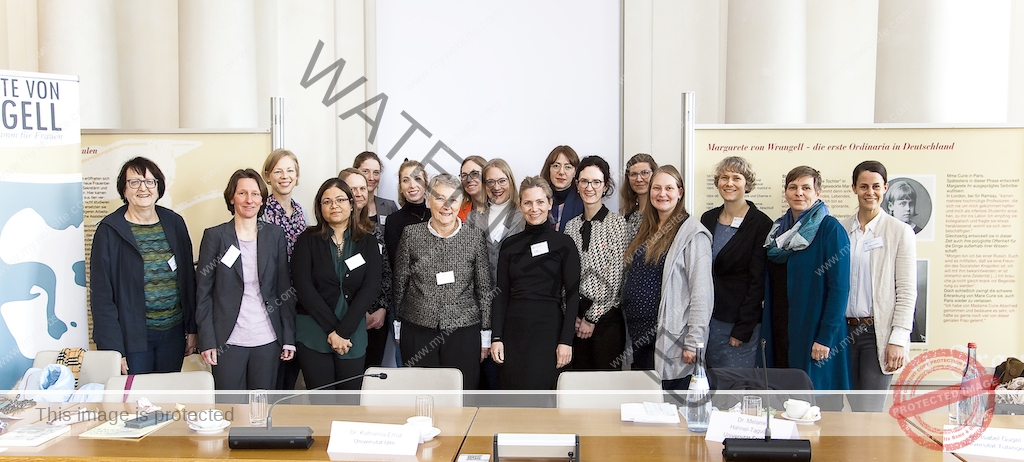
Network meeting of Margarete von Wrangell-Fellows with Dr. Dagmar Höppel (l.)
„With the Wrangell Program, we have dispelled the prejudice that women do not want to pursue a scientific career!“
Dr. Dagmar Höppel
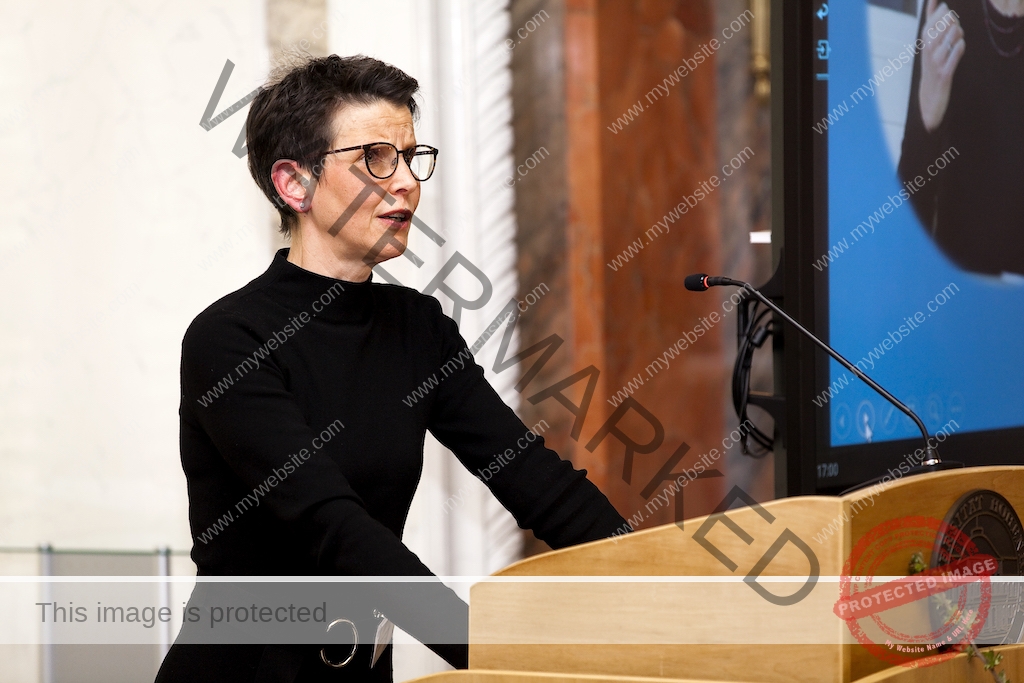
Prof. Dr. Katja Patzel-Mattern, Historian at the University of Heidelberg
Historian Prof. Dr. Katja Patzel-Mattern
Combative, Female, Successful
What distinguished Margarete von Wrangell? Prof. Dr. Katja Patzel-Mattern from the University of Heidelberg explored this question in her lecture. Von Wrangell had been a pioneer in many areas: as one of the first female students, one of the first scientific assistants, as the leader of a scientific experimental department, and finally as the first female professor.
“Out of 10,000 women with doctorates, von Wrangell was one of the few who could establish themselves at a scientific institution.” However, this was only possible because, as a noblewoman, she was socially secured and had received multilingual education from an early age. The frequent changes of residence contributed to her cosmopolitanism.
To this day, social origin remains a crucial factor for a successful scientific career. Because children from academic families still choose this professional path more often.
But Margarete von Wrangell not only had a special financial and social status but also knew how to successfully raise funds for her research and promote herself. She knew how to assert herself even against resistance and accusations of plagiarism, with her relationships with high-ranking personalities coming to her aid.
Many qualities that the first female professor exhibited are still relevant today, concluded Patzel-Mattern.
Agricultural scientist Prof. Dr. Torsten Müller
Why phosphorus research is still highly relevant
In his lecture Prof. Dr. Torsten Müller from the University of Hohenheim focused on the question of what significance Margarete von Wrangell’s research topic still holds today. When she began her work, phosphorus, as a component of mineral fertilizer, was a scarce commodity in Germany. After the First World War, importing this raw material had become difficult.
Even if this is no longer the case today, a phosphorus shortage is looming again in a few years, as Müller explained. This is because the majority of the world’s phosphorus reserves are located in Morocco. However, this country mines comparatively little phosphorus, so a shortage could occur in a few years.
Therefore, scientists at the University of Hohenheim, like Margarete von Wrangell, are working to increase the phosphate content in the soil using legumes. Compared to back then, the field trials now have a completely different dimension. And the scientists have broadened their view and also include microorganisms and genetics in their research.
It is little known that “the colorimetric phosphate detection method developed by Margarete von Wrangell at the time was groundbreaking,” Müller recounted. This detection is still the basis for modern analysis methods. In short, she was an extraordinary and “extremely grant-strong” researcher.
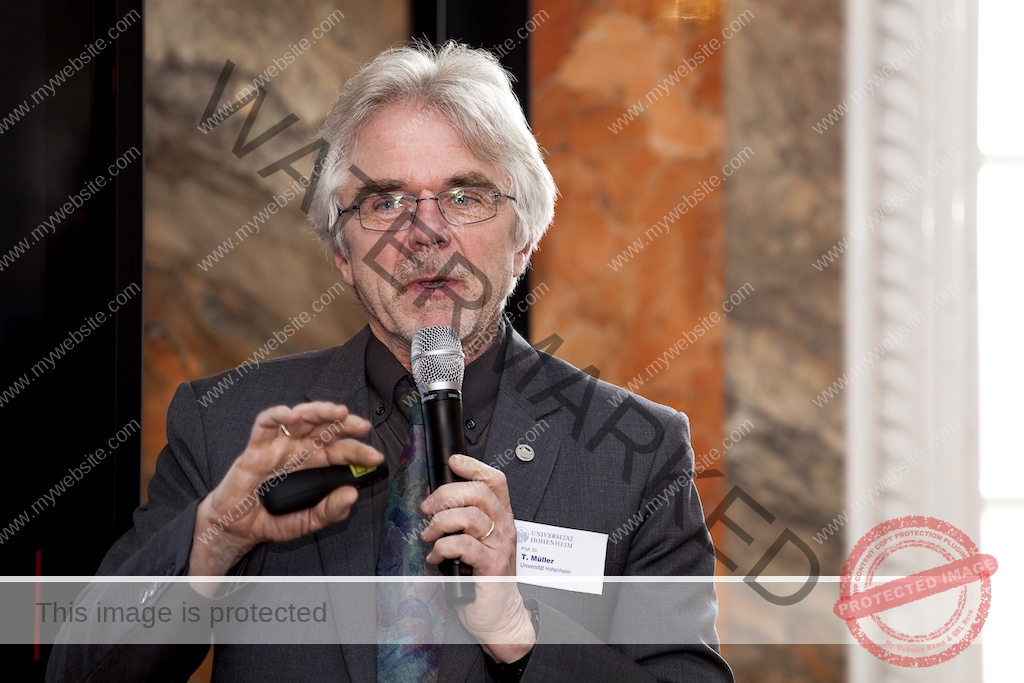
Prof. Dr. Torsten Müller, Agricultural scientist at the University of Hohenheim
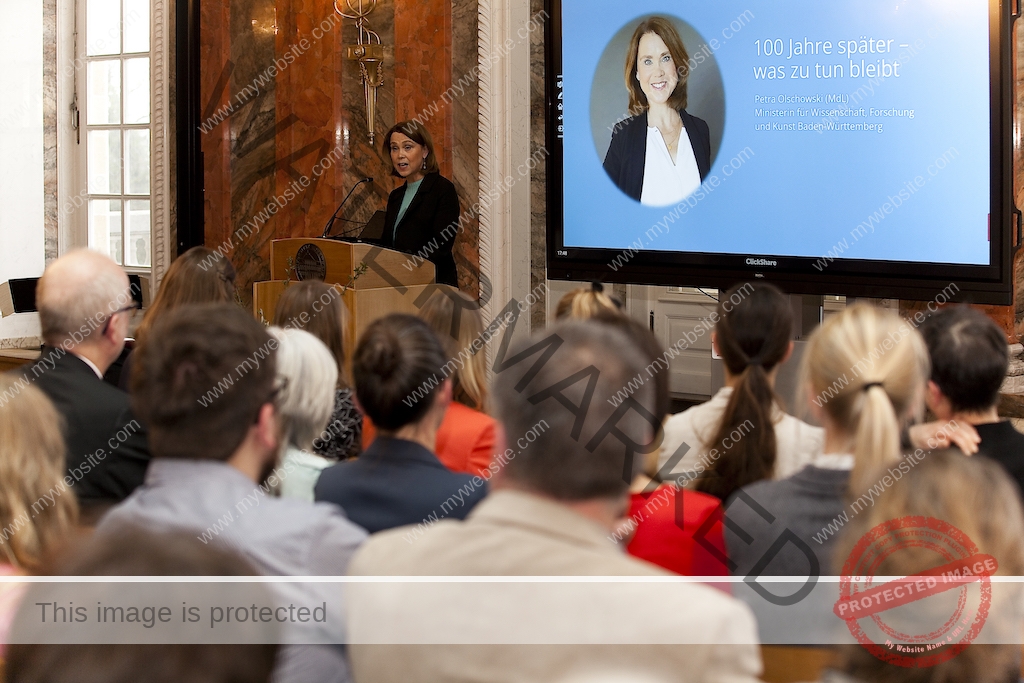
Petra Olschowski, Minister for Science, Research and Art in Baden-Württemberg
Minister Petra Olschowski MdL
„Equality is a leadership task!“
After reflecting on the research of Margarete von Wrangell, the discussion turned to what has changed for women in science since 1923. Petra Olschowski, Minister for Science, Research and Art in Baden-Württemberg, emphasized the importance of role models on the path to parity.
The Minister solemnly reminded that Germany is found in the lower third among European countries when it comes to the proportion of women in leadership positions in science. “Even today, it can still be uncomfortable to stand up for the topic of equality,” she said.
Three points are crucial for a change:
“Far too often we think enough has changed. But this does not apply to all areas.” Moreover, successful female scientists at universities are now more than ever being poached by the industry.
To counteract this, the Ministry of Science has decided to redesign the Margarete-von-Wrangell program. In the future, it should enable junior professors to employ a young scientist at the beginning of their post-doc phase for three years and support them in their research. “We have collected enough data. Now it’s time to act!” concluded the Minister.
The numerous guests concluded the evening in the foyer of the castle and visited the exhibition on women in science with a film contribution about Margarete von Wrangell.
The ceremonical program at the University of Hohenheim
“The First Female Professor in Germany – 100th Anniversary”
Musical Accompaniment:
Duo con animo: Birgit Maier-Dermann (Flute) and Günther Schwarz (Guitar)
Welcome:
Prof. Dr. Stephan Dabbert (Rector University of Hohenheim)
Video Message:
Bettina Stark-Watzinger (Federal Minister of Education and Research)
Greetings and Moderation:
Dr. Dagmar Höppel (VBWW), Dr. Birgid Langer (LaKoG), Prof. Dr. Ute Mackenstedt (Equal Opportunities Officer at the University of Hohenheim)
Lecture:
Margarete von Wrangell’s Path to Professorship – a Career in Her Time? Prof. Dr. Katja Patzel-Mattern (University of Heidelberg)
Lecture:
Margarete von Wrangell’s Research – Still Relevant?! Prof. Dr. Torsten Müller (University of Hohenheim)
Lecture:
100 Years Later – What Remains to be Done
Petra Olschowski MdL (Minister of Science, Research, and Art Baden-Württemberg)
Conclusion in the Foyer:
Presentation of the website for the anniversary year and presentation of the first film in a series about Margarete von Wrangell
